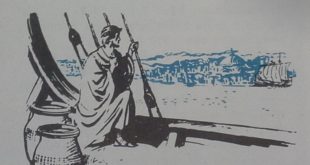Christianity was the movement that spread Across the Roman Empire Pointing the way for the rest of the ancient world toward belief in a single God. The year is 400 A.D. Andropolos paces impatiently up and down the deck of the merchant ship. He is eager to get back home; and to Andropolos, home is the city of Constantinople, a new capital of the Roman Empire. He can already see the walls and buildings of the great city shimmering in the distance. Now the ship is nearing the narrow Bosporus, the waterway where Europe and Asia are hardly a mile apart. The voyage from Ostia, the port of the old city of Rome, had been long and tiresome. Andropolos had been only too glad to leave Italy. The city that was once a hub of the Roman Empire, though still large, had a down at the heel look. Simultaneously the cities of northern Italy were becoming crowded with rough barbarians. Tall Germans also were filling the ranks of Roman legions. In times past, men such as these had been defeated again and again by Roman armies made up of men from Italy, but those victories had been won long ago and Rome had no such fighters left. Yes, Andropolos is thankful to leave Italy. Here in Constantinople the authority of the Roman emperor still counts. Andropolos shakes his head sadly as he recalls what has happened — the Roman Empire is not what it used to be. For Andropolos, though he is Greek born and Greek speaking, proudly calls himself a Roman citizen. The walls of Constantinople on the left grow closer as the ship enters the Bosporus. Soon it will dock in the harbour of the Golden Horn and Andropolos’ long voyage will be over. When he steps ashore, …
Read More »The Sound of Bells and Trumpets in Europe 1300 – 1600
Bells and trumpets sounded across Europe in the time that men would call the Middle Ages. Knights in glistening armour rode forth to serve God and their kings; life was like a stately procession winding through a landscape marked by castles and cathedrals. Each man knew his place. He was a prince, a knight, a squire, a priest, a craftsman, or a serf. He wore the clothes that belonged to his rank — the armour and family emblems of a nobleman, the robes of a churchman, or the rough wool jerkin of a serf. He lived according to an age-old set of rules — the knightly code of chivalry, the vows of a monk, or the duties of a serf to the lord who owned the land he farmed. Such, it was said, was the will of God. It seemed impossible to imagine that life could ever be any different and indeed, almost no one remembered that it had been different in the past. In Athens, once the most beautiful and exciting city in the world, the palaces and temples of the Greeks were vacant ruins, overgrown with weeds. In Rome, the vast arenas and the Senate House were silent. The Forum, the ancient gathering place of Roman throngs and center of the greatest empire man had known was now a cow pasture. Hidden away in the castles and cathedral libraries, manuscripts that held the science, poetry and wisdom of two thousand years of life and discovery lay dusty and unread. All this, too, it was said, was the will of God. To the men of the Middle Ages, ruins taught a lesson: life was short, the works of mankind soon fell to dust and a man’s time on earth should be spent only in preparing for death and what came …
Read More »

